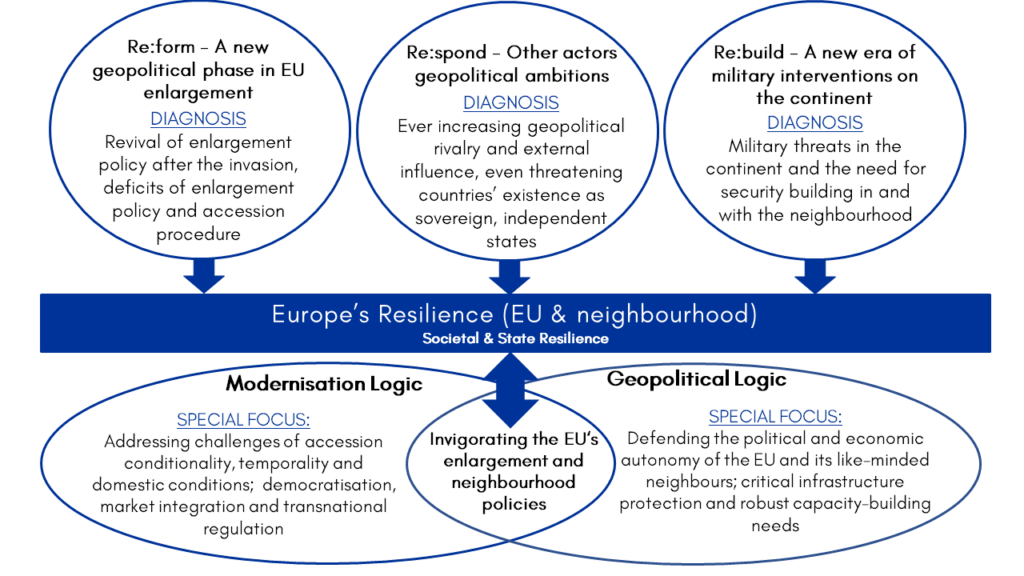HOW CAN THE EU INVIGORATE ITS ENLARGEMENT AND NEIGHBOURHOOD POLICY TO ENHANCE EUROPE’SRESILIENCE?
Our first goal is to investigate HOW TO REFORM the EU’s enlargement strategy in a new geopolitical phase, HOW TO RESPOND to other actors’ geopolitical ambitions in the Eastern Neighbourhood and Western Balkans, and HOW TO REBUILD the EU’s foreign policy arsenal in view of a new era of military threats (triple “R” approach) combining the modernisation and geopolitical logics of EU enlargement, leading to new data – e.g. a public opinion survey in Ukraine, a set of scenarios, an external influence index (Russia, China, Turkey),and a social policy compliance and cohesion scoreboard.
Our second goal is to elaborate an EVIDENCE-BASED, FORWARDLOOKING VISION FOR THE EU’s POLITICAL AGENDA AND INSTITUTIONAL FRAMEWORKS FOR CO-DESIGNING A MULTIDIMENSIONAL TOOLBOX (i.e. two tailor-made toolkits), together with InvigoratEU´s Expert Hub, Civil Society (CS) Network, Youth Labs, Workshops for Young Professionals and Policy Debates in a gaming set up, which will result in context-sensitive and actionable policy recommendations for European and national political stakeholders and (young) European citizens in particular.
Our third goal is to deploy a CDE (communication, dissemination and exploitation) strategy AIMING AT RECOMMENDATIONS FROM DAY 1 to maximize our scientific, policy and societal impact in invigorating the EU´s enlargement and neighbourhood policies to enhance Europe´s resilience.
ULTIMATELY, INVIGORATEU IS A DELIBERATELY LARGE CONSORTIUM respecting THE DIVERSITY OF EUROPE and POLITICAL PERSPECTIVES; 7 out of 18 are from GEORGIA, MOLDOVA, UKRAINE, and the Western Balkans (NORTH MACEDONIA, MONTENEGRO, SERBIA), COMPLEMENTED BY our CS Network of 9 representatives from all Western Balkan countries, Georgia, Moldova and Ukraine.
Providing an innovative conceptual framework based on the triple “R”-structure (reform, respond, rebuild) as well as an original empirical infrastructure based on new quantitative and qualitative data (social compliance scoreboard, external influence index, public opinion survey in Ukraine, comparative case studies, foresight visioning and back casting) and an innovative combination thereof along the lines of the project’s ‘AVIS Scheme’: Analysing, Visioning, Interrogating and Strategizing.
Investigating the benefits and deficits in enlargement and neighbourhood policy in a conflict- and postconflict set-up and in view of effects of deepening of market integration and cross-border movement by assessing past trends, current challenges and future prospects.
Gathering a set of clear-cut, measurable and comparable factors for identifying patterns and trends on how to counteract different scenarios of geopolitical ambitions and leverage of Russia, China and Turkey in the (potential) candidate countries.
Analysing the potential of the currently predominating geopolitical logic for refocusing the EU’s enlargement strategy. We will do this in terms of assessing the past, current and future impact of increasing connectivity and protection of critical infrastructure (energy, transport, communication including cyber security) in a wider Europe dimension, as well as investigating the EU’s role in building comprehensive security in and with the neighbourhood in the prospective era of military threats and security risks.
Development of a multidimensional toolbox for invigorating the EU’s enlargement and neighbourhood policy consisting of two toolkits – one targeting policy-makers and the other citizen education and civil society. This is based on a visioning process including consultations of the InvigoratEU Civil Society Network and InvigoratEU Resilience Expert Hub, as well as 20 Youth Resilience Labs across Europe, and 6 policy debates in a gaming set-up on political implications of the enhanced EU foreign policy arsenal that actively engages policy-makers, civil society actors and citizens alike in substantiating our research findings.
Communicating and disseminating InvigoratEU findings across three different target groups from the EU, member states and (potential) candidate countries (1. policy community, 2. civil society, citizens, youth; 3. research community including think tanks) in multifaceted and innovative ways (e.g. 6 podcasts, 2 InvigoratEU Workshops for Young Professionals, and a public contest); and providing continuously (starting in M1) policy recommendations on how to invigorate the enlargement and neighbourhood policy taking into account institutional, structural, political, economic and legal aspects of the endeavour as well as specific regional, generational and gender-related issues.

